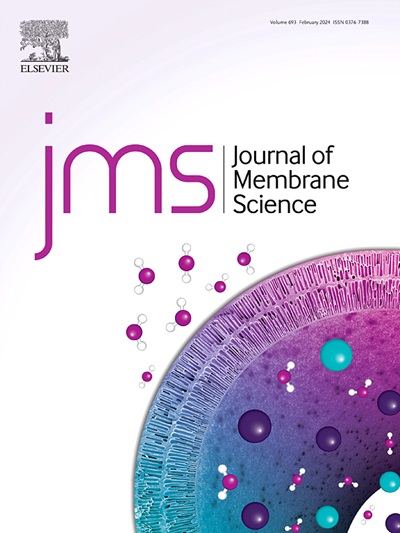High throughput polyamide-hydrazide reverse osmosis membrane mediated by dynamic covalent interlayer
IF 8.4
1区 工程技术
Q1 ENGINEERING, CHEMICAL
引用次数: 0
Abstract
Reverse osmosis (RO) is the preferred technology for seawater and brackish water desalination. The ongoing pursuit of scientific research and industrial innovation aims to develop high-performance RO membranes. An effective approach to enhancing the performance of composite RO membranes is the use of interlayers. To simplify the construction process of the interlayer and improve its regulation effect on the interfacial polymerization process, we propose a construction scheme for an in-situ dynamic covalent interlayer. By adding glutaraldehyde (GA) to the aqueous solution containing cyclobutane tetraformylhydrazide (CBTH), we successfully synthesized a crosslinked acylhydrazone interlayer onto a polysulfone (PSF) substrate during the aqueous coating stage to optimize the interfacial polymerization process. In the early stage of interfacial polymerization, the crosslinked acylhydrazone interlayer can bind the amine monomer, preventing the initial polyamide layer from becoming too dense and creating a self-regulating mechanism. In the later stages, it continuously supplies amine monomers to the reaction zone, compensating for defects in the polyamide layer and establishing a self-perfection mechanism. The in-situ simultaneous dynamic covalent interlayer increased the permeation flux of the CBTH-TMC membrane by 3 times (4.0 L m−2 h−1⋅bar−1) with NaCl rejection of 99.14 % by effectively controlling the membrane formation process. This approach demonstrates advantages in simplicity and operability, successfully overcoming the "trade-off" limitation of original polyamide-hydrazide membranes.

求助全文
约1分钟内获得全文
求助全文
来源期刊

Journal of Membrane Science
工程技术-高分子科学
CiteScore
17.10
自引率
17.90%
发文量
1031
审稿时长
2.5 months
期刊介绍:
The Journal of Membrane Science is a publication that focuses on membrane systems and is aimed at academic and industrial chemists, chemical engineers, materials scientists, and membranologists. It publishes original research and reviews on various aspects of membrane transport, membrane formation/structure, fouling, module/process design, and processes/applications. The journal primarily focuses on the structure, function, and performance of non-biological membranes but also includes papers that relate to biological membranes. The Journal of Membrane Science publishes Full Text Papers, State-of-the-Art Reviews, Letters to the Editor, and Perspectives.
 求助内容:
求助内容: 应助结果提醒方式:
应助结果提醒方式:


